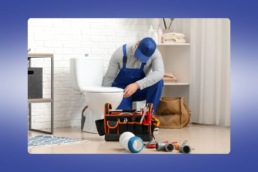Essential Insurance for Plumbers: Protecting Your Business and Workers
Key Takeaways
- Plumber’s insurance provides essential coverage for the unique risks plumbers face, including property damage, equipment theft, and professional negligence.
- General liability, professional liability, and worker’s compensation insurance are all crucial policies for plumbers to protect themselves, their employees, and their clients.
- Business property insurance covers physical assets, while product liability insurance safeguards against issues with faulty plumbing products or installations.
- Comprehensive insurance for plumbers is necessary to comply with state regulations, protect your business from financial loss, and ensure your operations run smoothly.
The plumbing industry employs over 537,200 workers who face unique risks while working with water, electricity, and gas.
Whether you’re a plumber starting your business or expanding your existing one, having the right insurance coverage is crucial. Without proper insurance, you may expose yourself and your business to financial loss from property damage, accidents, or theft.
This article will guide you through the types of insurance plumbers need to stay protected while offering their services.
What Is Plumber’s Insurance?
Plumber’s insurance is specialized coverage designed to protect plumbing businesses from the risks inherent in their work. Plumbing tasks, such as repairs, installations, and inspections, can lead to unexpected issues, including property damage, accidents, and equipment theft.
Insurance ensures you’re financially protected and able to recover quickly if something goes wrong during a project.
Who Needs Plumber’s Insurance?
Plumber’s insurance isn’t just for licensed plumbers. The following professionals also benefit from this coverage:
- Plumbing business owners
- Plumbing contractors
- Pipe contractors
- Sprinkler system installers
- Sewer and drainage system installers
- Sump pump installers
- Water heater installers
- Homebuilders and contractors
- Handyman services
Certain types of insurance are required in many states to protect both the plumber and their clients. It’s essential to ensure you have the right coverage to comply with state regulations and safeguard your business.
Types of Insurance for Plumbers
When selecting insurance, plumbers should work with an insurer familiar with the industry to ensure they’re adequately protected. Here are the essential insurance policies for plumbers:
General Liability Insurance
General liability insurance is the most basic and essential coverage for plumbers. It covers third-party claims for:
- Bodily injury
- Property damage
- Personal and advertising injury
For example, general liability insurance will cover the associated costs if a client’s property is damaged during a plumbing project, or if a customer trips over equipment and gets injured.
Professional Liability Insurance
This coverage specifically addresses the professional services plumbers provide. Professional liability insurance covers:
- Professional negligence
- Errors made during plumbing work
- Breach of contract
- Failure to complete a project on time
While general liability insurance covers accidents or injuries on the job site, professional liability insurance protects plumbers from legal claims related to their services.
Business Property Insurance
Business property insurance protects your physical business property, including office equipment, tools, and supplies, from damage or loss. This coverage helps you replace or repair damaged property to keep your business running smoothly, whether it’s due to fire, theft, or a weather-related incident.
Worker’s Compensation Insurance
Worker’s compensation insurance is required in most states for businesses with employees. This coverage ensures that employees who are injured or fall ill on the job receive medical treatment and compensation for lost wages. It can also cover long-term rehabilitation or retraining if an employee cannot return to their previous role due to a severe injury.
Worker’s compensation insurance protects the business from the financial burden of workplace injuries and helps employees recover without significant financial strain.
Commercial Auto Insurance
Commercial auto insurance provides coverage for vehicles used for business purposes. Whether your plumbers are driving to job sites or transporting tools, this insurance covers accidents that may occur during business-related travel. It protects the business from liability, property damage, or injuries caused in an accident involving a company vehicle.
Product Liability Insurance
Plumbers often install products that may later malfunction. Product liability insurance covers damage caused by faulty products or parts installed by the plumber. For example, if a plumber installs a faucet, and the pipe bursts due to a defect, this insurance helps cover the resulting damage and repairs.
Equipment Insurance
Plumbers rely heavily on tools and equipment. Equipment insurance protects your valuable tools and machinery against theft, loss, or damage. While some other policies offer limited coverage, a separate equipment insurance policy fully covers your specialized tools.
Why You Need Comprehensive Insurance Coverage
Plumbing businesses face numerous risks, from accidents on the job site to damaged or stolen equipment. Comprehensive insurance coverage protects you from these risks, allowing you to focus on growing your business. By working with an insurance provider who understands the unique risks in the plumbing industry, you can get the right coverage to stay protected.
Contact us today to learn more about the types of plumbing insurance that will best suit your business and ensure you’re fully covered.
FAQs
1. What types of insurance do plumbers need?
Plumbers need general liability insurance, professional liability insurance, business property insurance, worker’s compensation, commercial auto insurance, product liability insurance, and equipment insurance.
2. Is worker’s compensation insurance mandatory for plumbing businesses?
In most states, businesses with employees must have worker’s compensation insurance to cover medical expenses and lost wages for injured workers.
3. What is the difference between general liability and professional liability insurance?
General liability insurance covers accidents and injuries on the job site, while professional liability insurance covers mistakes or negligence related to the plumber’s professional duties.
